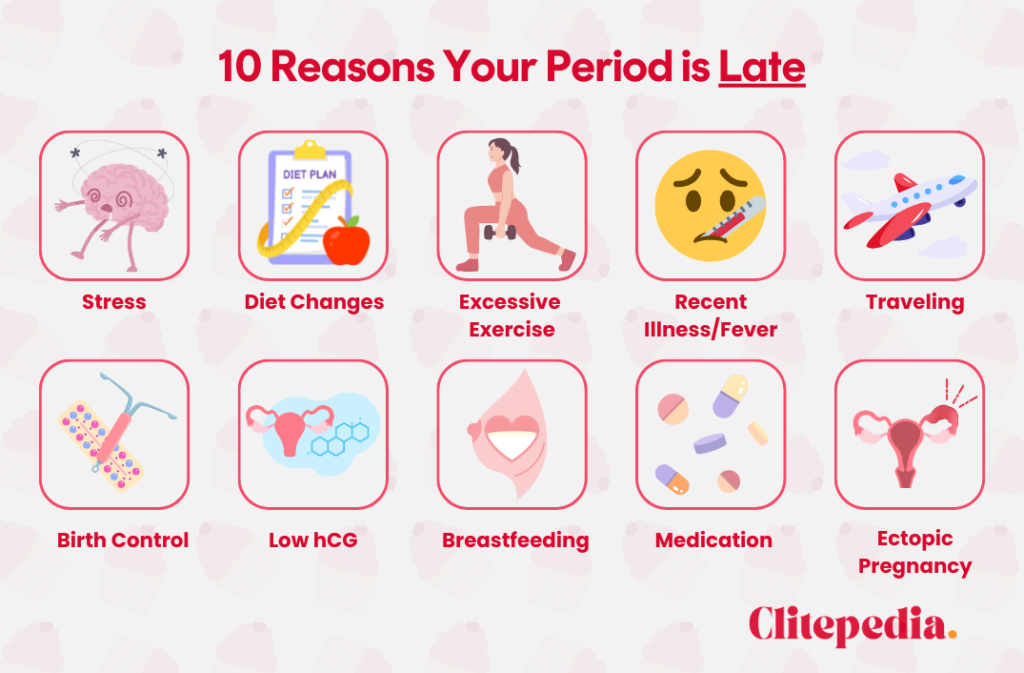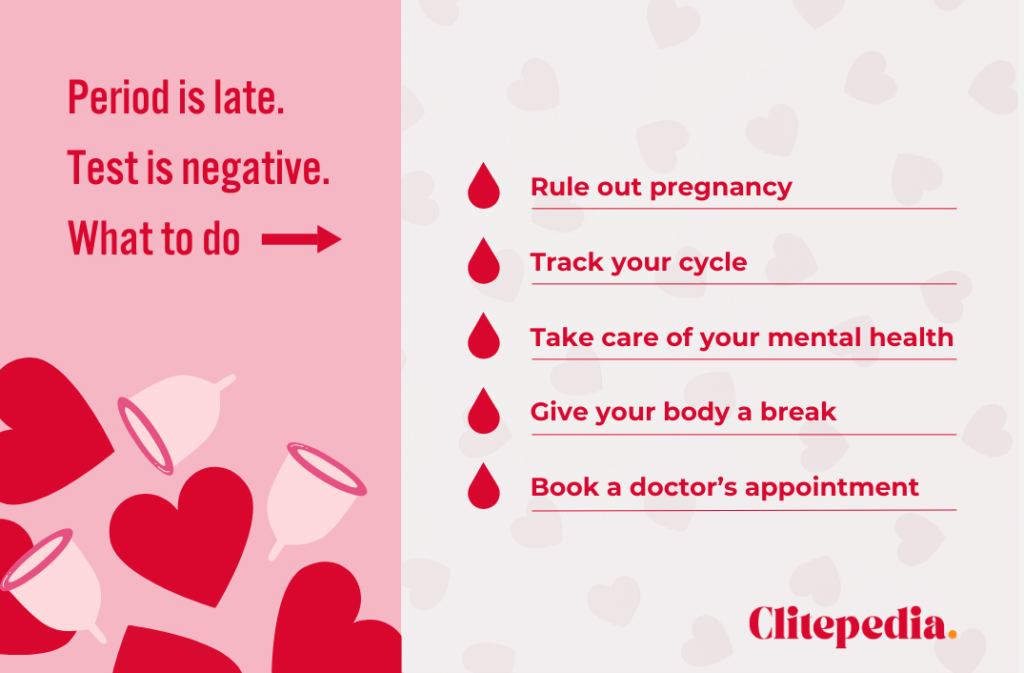
Alriiiight, picture this: your period is two weeks late. You’ve already peed on enough pregnancy tests to qualify for some kind of loyalty program at the pharmacy. Each one comes back as negative, and now you’re sitting there thinking, “What. The. Actual. F***?”
Is your uterus playing mind games with you? Or are you secretly pregnant, and the tests just aren’t getting the memo? We’ve got the lowdown on why your cycle’s gone rogue – and why your negative pregnancy test might actually be your body’s way of saying, “Relaaax.”
Let’s take a look at this confusing cocktail of hormones, stress, and WTF-ery.
First Things First: Don’t Panic

Look, we get it (no, we really do).
The first thing that runs through your head when your period is late is pregnancy. But before you spiral into a full-blown Google search hole, let’s remind you: there are a lot of reasons Aunt Flo might ghost you, and pregnancy doesn’t need to be at the top of the list.
There are also a whole lot of things that can throw off your cycle, some of which are totally normal and others that might need a little extra attention.
Your body is a mysterious, beautiful, complicated thing… Oh, and can we just say, your uterus is not a drama queen; she’s just complex, okay?
Reasons You’re Late (and Not Pregnant)
Okay, let’s break it down.
While you’re sitting there, staring at your negative pregnancy test like it just punched your grandma in the t!ts, take a minute off to have a look at the many reasons your period could be fashionably late (that don’t involve ejecting another human out of you at the end of it).

Short-Term Causes
- Stress:
Oh, the classic culprit. Stress can mess with your hormones, and when your hormones are out of whack, so is your cycle.
Whether you’re stressing over work, relationships (clearly Aunt Flo doesn’t like him), or life in general, your uterus is basically side-eyeing you like, “Girl, calm the f*** down.”
- Diet Changes:
Have you recently swapped the ice cream for kale? Or maybe you’ve been on some crazy diet to drop the 5 pounds you gained during Netflix binges. That’s cool, but your body’s like, “What the hell is happening here?”.
A drastic change in diet, especially if you’ve been restricting calories or eating too much of one thing, can slow down your cycle.
- Excessive Exercise:
You know that HIIT workout that’s basically the modern equivalent of what can only be described as torture? Yeah, if you’re pushing your body hard, it might delay your period.
Too much exercise can cause your body to stop producing enough estrogen to trigger ovulation and menstruation.
- Recent Illness or Fever:
If you’ve been sick or battling a high fever, your body’s focus has probably been on recovering, not on your period. And obviously, your uterus being the dramatic b!tch that she is, has taken offense to this and went on strike.
- Traveling:
If you’ve been flying across time zones or on a major trip, your circadian rhythm might be out of sync. Travel can throw off your body clock and delay your period by a few days or even a couple of weeks.
- Birth Control Shenanigans:
Whether you’ve started a new form of birth control or stopped taking it, your period might need a minute to adjust. Hormonal birth control can suppress your period, and when you stop, your cycle may not return to normal right away.
If you’ve recently started or stopped hormonal birth control, your period might just be on her own little vacation.
- Low Hormone Levels:
Low levels of hCG (the pregnancy hormone) might be to blame. Sometimes, your body takes its sweet time producing enough for a test to detect, especially if you ovulate later than expected.
If your period doesn’t arrive after a few days, it’s time to pee on another stick or check in with your doctor to be sure.
- Breastfeeding:
Breastfeeding can be a total hormone hijacker and your body’s way of saying, “We’re on a baby-making pause for now.”
Prolactin – the hormone that keeps the milk flowing – can also press pause on ovulation, making your period fashionably late (or skipping it altogether).
- Medications:
Certain medications, such as antidepressants, antipsychotics, blood thinners, NSAIDs, and more, can cause your period to either be delayed or stopped.
- Ectopic Pregnancy:
Because hCG levels tend to ride more slowly in these cases, it may show up as negative on a pregnancy test – although this is extremely rare.
It’s a rare but serious situation, so if you’re experiencing symptoms like sharp pain or dizziness, don’t hesitate – reach out to a doctor right away.
- Recent Pregnancy Loss:
A miscarriage or abortion can disrupt your hormone levels, which can delay your period for a few weeks or longer.
If this is the case, you should reach out to your healthcare provider to ensure everything is okay. And we just wanna say, you absolutely should buy that thing you wanted, you deserve it.

Long-Term Causes
- Polycystic Ovary Syndrome (PCOS):
PCOS is a hormonal condition that can mess with your ovulation, making your periods irregular or even nonexistent for months. If this is happening, it might be time to see your gynecologist for diagnosis and management.
- Thyroid Issues:
An underactive thyroid (hypothyroidism) or an overactive thyroid (hyperthyroidism) can interfere with your menstrual cycle. If your thyroid levels are out of balance, your period may be irregular or late.
- Perimenopause:
Yes, perimenopause can start earlier than expected (looking at you mid-30’s).
It’s the period of time before menopause when your ovaries gradually stop producing eggs, and it can cause irregular periods, missed periods, and all sorts of fun (absolutely not fun) hormone-related symptoms.
- Endometriosis:
Endometriosis happens when tissue that’s supposed to stay inside your uterus decides to go rogue and grow elsewhere. Ie. Outside of your uterus. It can cause serious discomfort and throw your cycle off balance. Yep, endo is as fun as it sounds.
If you’ve been struggling with painful periods or irregular cycles, this could be the reason why your period’s MIA.
- Hyperprolactinemia:
This is when your body produces too much of the hormone prolactin (the milk-making, boob-growing hormone). It can stop ovulation and cause irregular or missed periods.
- Chronic Health Conditions:
Conditions like diabetes or autoimmune diseases can throw your cycle for a loop, causing delays or no-shows. Because, of course, life doesn’t think you’ve got enough on your plate already.
If this sounds like it could be you, a chat with your doctor might be on the cards. They’ll be able to check to see how your condition might be playing tricks on your cycle.
- Uterine or Ovarian Problems:
In some rare cases, fibroids, cysts, or even tumors can shake up your menstrual schedule. It’s worth having a heart-to-uterus chat with your doctor if something feels off.
Let’s Talk About Your Vag’s Mood Swings
If your body feels like it’s throwing a tantrum, it probably is. Hormonal imbalances can make you feel bloated, crampy, or just straight-up stabby (hello, PMS with no period!).
The good news? It’s fixable. Whether it’s lifestyle tweaks, medication, or simply needing to just. chill. out. your doctor can guide you back to having a happy little uterus.
When to Be Concerned
Okay, jokes aside, there are times when a late period deserves your full attention. Severe pain, excessive spotting, or other symptoms like fever? Don’t wait. Your uterus deserves a check-in with a professional. False negatives do exist when it comes to pregnancy tests, although it is rare.
What Should You Do if Your Period Is Late and Your Test Is Negative?

- Rule Out Pregnancy:
Pee on another stick (or two or three) if it helps you sleep at night. If you’re a pregnancy paranoia girl and your mind still isn’t at ease, consider getting a blood test. It’s more accurate than the good old pee stick test.
- Track Your Cycle:
Time to get organized! Download a period tracker app or start jotting down notes if you’re old-school cool. Look for any patterns in your cycle, and see if the delay seems to be related to stress, diet, or any lifestyle changes.
- Take Care of Your Mental Health:
Stress can delay your period, so take a moment to chill the f**k out. While it’s easier said than done to eliminate stress completely, is the thing you’re stressed about really worth your health?
- Give Your Body a Break:
If you’ve been going all in on the diet or exercise, ease up a little. Rome wasn’t built in a day. Shift your focus to looking after your body in a healthy, sustainable way, and make sure you’re getting enough sleep.
- Book an Appointment with Your Doctor:
If it’s been a few weeks and you’re still in limbo, it’s time to call in the professionals. A doctor can run tests, check your hormone levels, and help you get to the bottom of why your period’s been playing hide and seek.
How Late Can Your Period Be?
Periods can be unpredictable, and you can experience delays of up to 2 months even if you’re not pregnant. However, if you’ve ruled out pregnancy and the delay stretches to 3 months – it might signal something more serious, like amenorrhea (a fancy term for missed periods).
If Aunt Flo’s taking an extended vacation, it’s time to check in with a gynecologist to pinpoint the root cause and get things back on track.
You’re Not Alone, We Promise
This sh!t happens to the best of us. Whether you’re spiraling on Google at 3 a.m. (been there) or texting your best friend, “WTAF is going on?”—know this: your body is weird, wonderful, and sometimes just kind of a b!tch.
So pour yourself a glass of your favorite tipple (or decaf tea if you’re still nervously side-eying those pregnancy tests), take a deep breath, and cut your uterus some slack. She’s doing her best, even if it doesn’t always feel like it.
FAQs: Period 2 Weeks Late, Negative Test—WTAF is Going On?
Q: Can stress make your period late?
A: Absolutely, yes. Stress is the ultimate period blocker. When you’re stressed out, your body releases cortisol, which can send your hormones a bit haywire and delay your period. Aunt Flo is a sensitive woman and she doesn’t like that stress malarkey one. bit.
Q: How long is too long to wait for a period?
A: If your period is more than 30 days late, or you’re consistently missing it, it’s time to book an appointment with your gynecologist. It could be a sign of something more serious, like PCOS, thyroid issues, or hormonal imbalances. The joys of being a woman!
Q: Can I be pregnant with a negative test?
A: While it’s rare, yes. If you tested too early (before your missed period or within the first couple of days), your body might not have enough pregnancy hormone (hCG) to register on the test.
You could also have a chemical pregnancy, where the pregnancy ends very early on, but your body hasn’t fully processed it yet.
Q: What are the signs of PCOS?
A: PCOS can cause missed or irregular periods, excess hair growth (hello, chin hairs), acne, and weight gain. If any of this sounds familiar, it might be worth chatting with your doctor about it.
Q: What should I do if my period is late but I’m not pregnant?
A: Chill, girl. Track your symptoms, rule out stress or changes in diet and exercise, and give your doctor a call if it doesn’t straighten out. Your body is complex AF, and sometimes it just needs a little time to sort itself out.
Q: Why is my pregnancy test negative, but I missed my period?
A: This can happen for a couple of reasons. You might have tested too early, or your hCG levels are too low for the test to pick up just yet. Hormonal imbalances or even conditions like PCOS can also cause a delay in your period without a positive pregnancy test.
If you’re still missing your period after a few weeks, it’s time to reach out to your doctor.
Q: How long does it take for hCG to show up in urine?
A: Typically, hCG levels can be detected on a pregnancy test around 8 days after conception. However, not all women have high enough levels to show up on a home test right away. Testing a few days after a missed period gives you the best chance for a clear result.
Q: Can you be pregnant and never test positive?
A: While it’s rare, it can happen. Some women have very low levels of hCG, making it difficult to test positive, especially in the early weeks. Conditions like ectopic pregnancies or chemical pregnancies might also cause negative tests despite being pregnant.
If you still have symptoms like nausea or fatigue, it’s worth checking in with your doctor for blood tests.
Q: Can twins give a negative pregnancy test?
A: It’s unlikely, but it can happen. While carrying twins usually causes higher levels of hCG, some women still experience lower-than-average levels early on in the pregnancy.
So, even though twins usually make things more obvious (hello, double trouble!), a negative test is still possible early in the pregnancy.
Q: Can I do the test wrong?
A: Yep, it happens. Testing too early, not following the instructions, or checking the test result too early (we know, the minutes feel like hours) can lead to inaccurate readings.
Make sure you follow the instructions to the letter and give it a couple of minutes before you interpret the results. Even a faint line can be a positive.
Q: Do I have to take the test first thing in the morning?
A: Technically, yes, if you want the best chances for a positive result. Morning urine is usually the most concentrated and has the highest level of hCG.
However, if you’ve waited long enough after your missed period, it might not be necessary to wait for the morning. But if you’re impatient and want the most accurate result, go for that first pee of the day.
Q: When is it too early to test?
A: Testing too early is a one-way ticket to confusion and disappointment. Pregnancy tests measure hCG, and it usually takes about 6-12 days after conception for hCG to show up in your urine.
If you test before you’ve missed your period, you could be testing too early. Aim to test at least a few days after your missed period or wait until you’re about a week late for the most accurate result.



